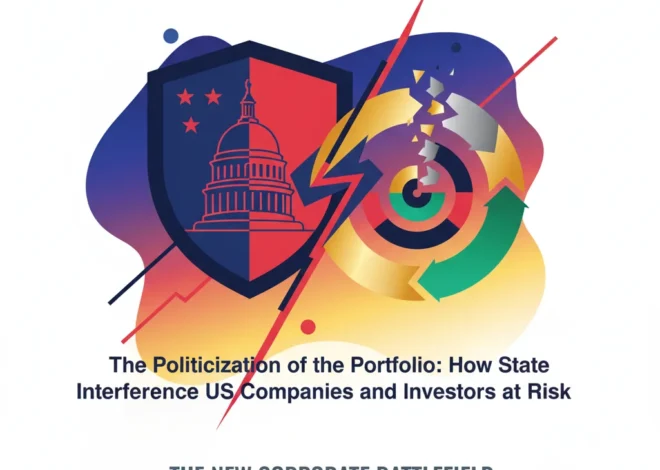Beyond the Élysée: Sarkozy’s Conviction and the Real Bottom Line for Global Investors
The conviction and impending incarceration of a former head of state is a seismic event in any nation. When that nation is France—a G7 member and a cornerstone of the European economy—the tremors are felt far beyond its borders. The recent decision by a Paris appeals court upholding a one-year prison sentence for former President Nicolas Sarkozy in the “Bygmalion” campaign finance affair is more than just a political drama; it’s a critical data point for investors, financial analysts, and business leaders evaluating the landscape of European political risk and institutional integrity.
While the headlines focus on the fall of a once-powerful leader, the underlying story for the world of finance and investing is one of institutional resilience. This verdict, concerning illegal financing during his 2012 re-election campaign, is not a sign of a nation in turmoil. On the contrary, it can be interpreted as a powerful affirmation of the rule of law, a fundamental pillar supporting any stable and attractive investment environment. For those managing portfolios or making strategic business decisions, understanding the nuances of this event is crucial for gauging the long-term health of the French economy.
The Anatomy of a Scandal: The Bygmalion Affair
To grasp the economic implications, one must first understand the financial mechanics of the scandal itself. The case, colloquially known as the “Bygmalion affair,” centers on Sarkozy’s 2012 presidential campaign, which vastly exceeded France’s strict campaign spending limits. The legal spending cap was set at €22.5 million. However, prosecutors successfully argued that Sarkozy’s campaign spent at least €42.8 million, nearly double the allowed amount (source).
The overspend was concealed through a sophisticated system of fake invoices issued by the public relations firm Bygmalion, which organized the campaign’s lavish rallies. These costs were fraudulently charged to Sarkozy’s UMP party (now Les Républicains) instead of the campaign itself. This wasn’t merely a political misstep; it was a calculated financial deception designed to manipulate the democratic process. The court found that Sarkozy “was aware” of the spending limits and “voluntarily” failed to supervise his campaign’s expenses. The involvement of a political party’s finances and a private-sector firm highlights the critical intersection of political ambition and corporate complicity, a nexus that always raises red flags in risk analysis.
For the banking and finance sectors, this case serves as a stark reminder of the importance of due diligence and the reputational and legal risks associated with political financing. It underscores the need for robust compliance frameworks to prevent financial systems from being used as conduits for illicit activities, whether in the corporate or political sphere.
Beyond the Missing Parcel: How US Shipping Chaos Signals Deep Cracks in the Global Economy
Rule of Law: The Ultimate Economic Asset
The most significant takeaway for the international investment community is not the guilt of one man, but the strength of the system that held him accountable. In many parts of the world, the concept of a former head of state facing genuine legal jeopardy remains unthinkable. Such impunity is often a hallmark of developing economies or states with weak democratic institutions, and it invariably translates into a higher risk premium for investors. Corruption and a lack of accountability create an unpredictable business environment where connections matter more than contracts.
France, by contrast, has demonstrated that no one is above the law. This reinforces its status as a mature democracy with an independent judiciary—a factor that credit rating agencies and institutional investors weigh heavily. According to the 2023 Corruption Perceptions Index by Transparency International, France ranks 20th globally, ahead of countries like the United States. While not perfect, this verdict strengthens its standing. A predictable legal framework where rules are enforced uniformly is the bedrock upon which long-term capital investment is built. It assures investors that their contracts will be honored, their property rights protected, and that they can compete on a level playing field.
This is not an isolated event for the former president, which further illustrates the judiciary’s persistent scrutiny of power. Below is a summary of the key legal challenges he has faced.
| Case Name | Core Allegation | Status / Outcome |
|---|---|---|
| The “Bygmalion” Affair | Illegal campaign financing and exceeding spending limits in the 2012 presidential election. | Convicted; sentenced to one year in prison (to be served under electronic monitoring). Appeal ongoing. |
| The “Wiretapping” Affair | Corruption and influence peddling, accused of trying to obtain confidential information from a magistrate. | Convicted; sentenced to three years in prison, two of them suspended. First former French president to receive a custodial sentence (source). Appeal ongoing. |
| Libyan Financing Affair | Allegations of receiving millions of euros from the late Libyan dictator Muammar Gaddafi for his 2007 campaign. | Under formal investigation; trial set to begin in 2025. Sarkozy denies all wrongdoing. |
This pattern of judicial pursuit sends a clear message: political power does not grant perpetual immunity. For a long-term investor in the French stock market or sovereign debt, this is a profoundly reassuring signal about the country’s underlying stability.
From Political Risk to Technological Solution
High-profile scandals like the Bygmalion affair invariably force a conversation about prevention. How can modern systems be designed to avoid such large-scale financial deception in the future? This is where the world of financial technology, or fintech, offers intriguing possibilities.
The core of the Bygmalion fraud was opacity—a complex web of invoices and transactions designed to obscure the true source and destination of funds. This is precisely the kind of problem that emerging technologies like blockchain are designed to solve. Imagine a future where campaign donations and expenditures are recorded on a distributed, immutable ledger. Every transaction would be transparent and traceable in real-time by regulators and the public. Such a system could make it nearly impossible to exceed spending limits or hide illicit funding sources.
While the political will for such radical transparency may be lacking today, the Sarkozy verdict highlights the inherent weaknesses of traditional accounting and oversight. As fintech solutions mature, their application in public sector governance and political financing will become a more mainstream topic. For the economics of democracy, this could be a game-changer, reducing the potential for corruption that ultimately erodes public trust and damages a nation’s investment brand.
The Great Leisure Myth: Why AI and Productivity Won't Kill the 40-Hour Work Week
Conclusion: A Bullish Verdict for the French Economy
The image of a former French president being ordered to wear an electronic tag is jarring. Yet, for those engaged in the dispassionate analysis of risk and opportunity, the event should be viewed through a different lens. It is not a story of national decline but one of institutional fortitude.
The conviction of Nicolas Sarkozy reinforces the very principles that make a developed economy a reliable destination for capital: the supremacy of law, the independence of the judiciary, and a commitment to holding power accountable. It demonstrates that the systems of oversight in France are not merely ceremonial. While no market is without risk, this verdict helps solidify the country’s reputation as a place where the rules of the game are clear and, crucially, are enforced.
For investors, from those trading equities on the CAC 40 to those making long-term strategic investments in French industry, the message is clear. The political headlines may be turbulent, but the institutional foundations of the French Republic—and by extension, its economy—have once again proven to be remarkably strong.
The Private Equity Paradox: Why The Industry's Big Comeback Is An Inside Job


